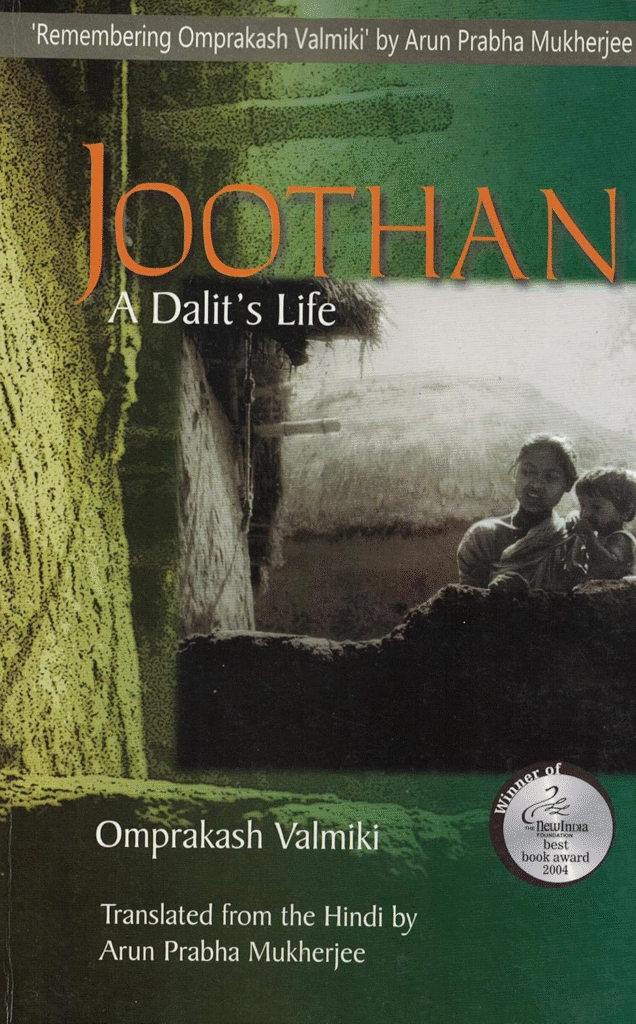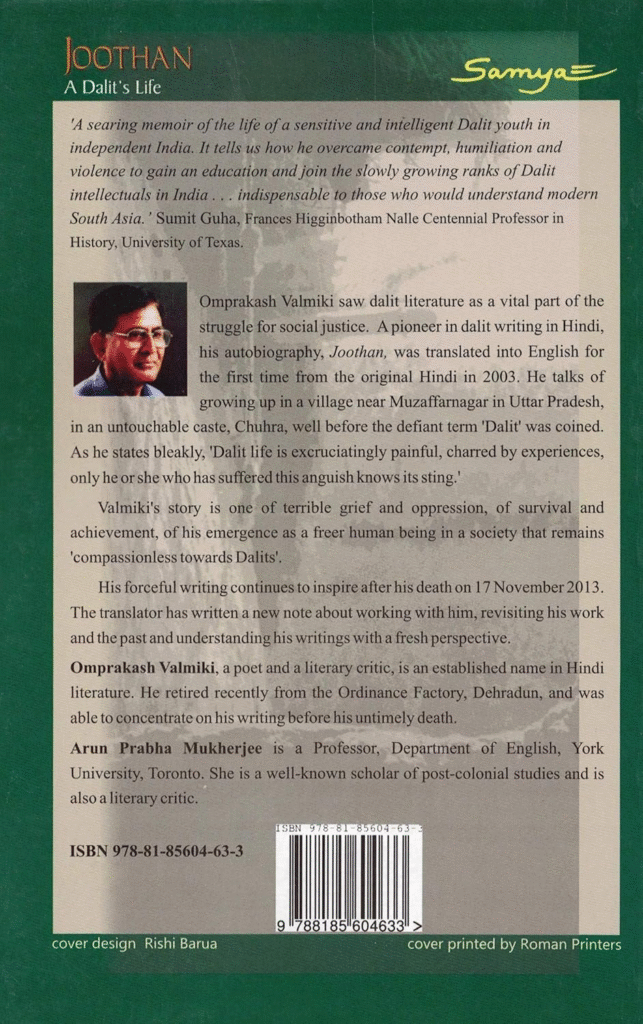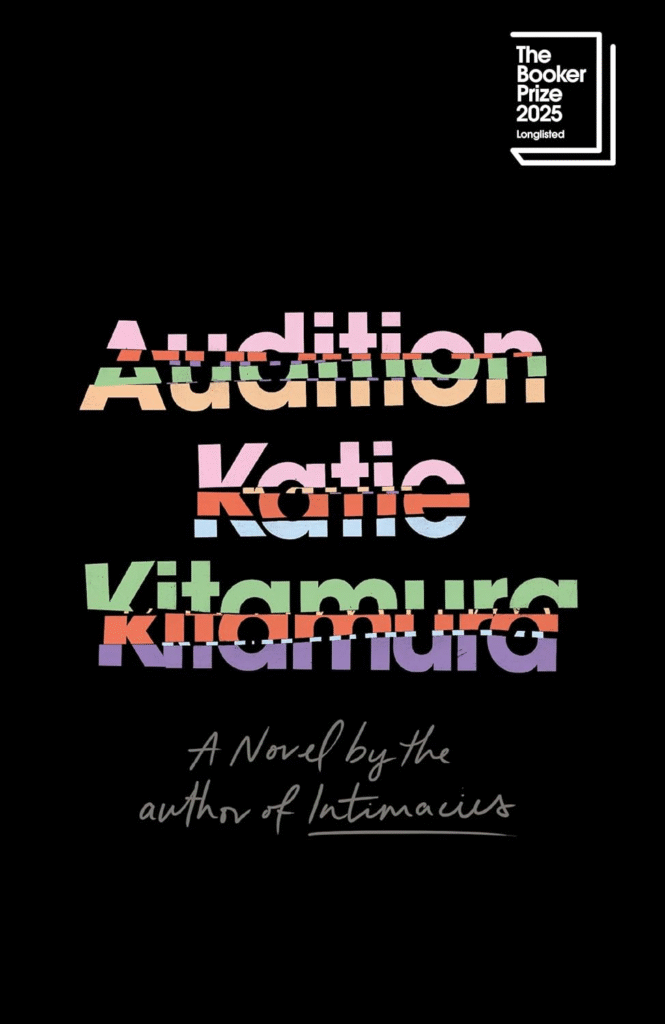Joothan: A Dalit’s Life by Omprakash Valmiki is a deeply moving and brutally honest autobiography that gives voice to those who have been silenced for generations. Joothan was first published in Hindi in 1997 and later translated into English in 2003. For the first time, Dalits are telling their own stories in their own words. Unlike in the past, where outsiders such as historians and anthropologists narrated their lives, this book Joothan allows us to hear directly from someone who has lived through the pain and humiliation of caste-based discrimination. Valmiki was born into the Chuhra community, an untouchable caste in a village near Muzaffarnagar in Uttar Pradesh. His story begins long before the term “Dalit” was commonly used and captures a time when caste dictated every part of life. The title Joothan refers to the scraps of food thrown away by upper castes and given to Dalits. It is not just a word but a painful symbol of the dehumanizing treatment forced upon an entire community.

In Joothan , Omprakash Valmiki takes readers through his childhood filled with hardships and deep-rooted social injustice. His everyday life was surrounded by rejection, whether it was in schools, public spaces, or within the larger community. Being treated as untouchable was not just about social status. It affected his education, his sense of identity, and even his right to dream. The way Valmiki describes the acts of untouchability he endured is gut-wrenching. He writes about being made to sit on the floor in school, to clean toilets as a student, and to accept food only after everyone else had eaten. These are not just stories of the past. They are still the lived reality for many, and Valmiki uses his words to remind us of that.
What makes Joothan even more powerful is the way Valmiki finds his strength. Despite overwhelming odds, he fights to get an education, to find a voice, and eventually to become a respected writer and literary critic. His journey from the margins of society to becoming a figure of resistance and empowerment is truly inspiring. This is not a story of victimhood. It is a story of courage, survival, and rising above systemic oppression. His determination to speak out, to break barriers, and to tell the truth, no matter how painful, is what gives this book its emotional weight.
The English translation by Arun Prabha Mukherjee does full justice to Valmiki’s voice. It captures not just the literal meaning but the emotional intensity and the cultural context. Mukherjee adds a powerful foreword that helps readers understand the historical background and the importance of Dalit literature in India’s literary and political landscape. This makes Joothan: A Dalit’s Life not just a personal memoir but also an important political document. Through this translation, the world is introduced to a side of India that is often ignored or glossed over. The honesty in Valmiki’s storytelling pierces through layers of denial and ignorance.
Joothan forces readers to confront the reality of caste and the cruelty it imposes. It is a mirror to the deep inequalities that still exist in Indian society. Valmiki does not write for sympathy. He writes to awaken, to provoke, and to ignite thought. His story serves as a reminder that while the laws may have changed, social attitudes still lag behind. The pain of being treated as less than human is still very real for millions. This book should be mandatory reading for anyone trying to understand India’s social fabric. It is a heartbreaking yet powerful account of human dignity and the unbreakable spirit of those who refuse to be silenced.
Read Also: What Does Israel Fear from Palestine? by Raja Shehadeh
Book Availability, Formats, and Pricing
Joothan: A Dalit’s Life by Omprakash Valmiki is available in multiple formats to suit different readers. The English paperback edition, translated by Arun Prabha Mukherjee, was published by Bhatkal & Sen on 1st December 2007 and is priced at approximately ₹471. This version contains 184 pages and is widely available across platforms like Amazon, Flipkart, and BookStation. For digital readers, the Kindle edition is also available internationally, priced around ₹1,200 depending on the region. It provides the same powerful content with the convenience of an e-reader format. The original Hindi version of Joothan is also available under the same title, published by Radha Krishna Prakashan. This edition is usually sold in a single volume or as a two-part series and is priced more affordably around ₹199, making it accessible for Hindi readers. Both versions continue to be in demand for academic studies, social awareness campaigns, and personal reading. Whether in English or Hindi, paperback or Kindle, Joothan remains easy to purchase online and is a must-have for anyone serious about understanding caste realities in India.
Read Also: Original Sin by Stanly Johny: Book Review
About the Author of Joothan: A Dalit’s Life

Omprakash Valmiki (1950–2013) was a renowned Hindi poet, writer, and literary critic who emerged as a powerful voice in Dalit literature. Born in Barla village in Muzaffarnagar, Uttar Pradesh, he endured severe caste-based discrimination from a young age. Despite facing intense social and economic challenges, he completed a Master’s degree in Hindi literature. His experiences became the foundation for his groundbreaking autobiography Joothan, which brought national and international attention to the lived reality of Dalits in India. Valmiki also authored several influential works including short stories and critical essays. He also authored powerful collections of poetry such as Sadiyon Ka Santaap (1989), Bas! Bahut Ho Chuka (1997), and Ab Aur Nahin (2009) along with short story anthologies including Salaam (2000) and Ghuspaithiye (2004), and critical works like Dalit Sahitya Ka Saundaryashastra (2001) and Safai Devta (2009). He worked for many years at the Ordnance Factory in Dehradun, and after retirement, he devoted himself fully to writing. Until his untimely death in 2013 due to stomach cancer, Valmiki continued to challenge social norms through his literary voice, earning him several prestigious awards and lasting recognition as a pioneer in Indian Dalit literature.
Arun Prabha Mukherjee is a professor in the Department of English at York University in Toronto. She is widely known for her work in postcolonial studies and literary criticism. As the translator of Joothan from Hindi to English, she played a vital role in bringing Valmiki’s story to a global readership. Her thoughtful introduction and contextual analysis enriched the translation, helping readers understand the cultural, political, and literary importance of the work. Through her scholarship and translation, Mukherjee has contributed greatly to expanding the reach of Dalit voices in global literature.
Read Also: Wafadari Imaandari Zimmedari by Lt Gen Dhillon
Thematic Analysis of Joothan: A Dalit’s Life
- Caste Discrimination and Social Injustice: In Joothan Omprakash Valmiki gives a raw and painful account of caste discrimination that ruled every part of his life. From his early days, he was treated as impure and unworthy just because of his birth into the Chuhra community. He was not allowed to sit with others in class or drink from the same water pots. He was forced to do degrading work like cleaning toilets and schoolyards. Valmiki makes it clear that caste was not just a word but a daily wound. This bookshows how this deep-rooted injustice operated not only in actions but also in thoughts and attitudes, and how it continues to impact people even today.
- Struggle for Education and Self-Respect: One of the most powerful themes in Joothan is the author’s painful struggle to gain an education. His father believed that only education could break the chains of caste, but society did everything possible to block that path. Teachers insulted him, punished him unfairly, and gave him the dirtiest jobs in school. Yet Valmiki did not give up. He held on to education as his only hope. His journey through school and college is marked by both hard work and humiliation. This book turns education into a weapon, not only for personal growth but for fighting back against injustice.
- Resistance and Courage: Joothan is not just about suffering. It is also about standing up and fighting back. Valmiki refuses to be silent or ashamed of his caste. Instead of hiding, he embraces his identity and speaks boldly about the cruelty he faced. He becomes friends with others from oppressed communities, stands against discrimination, and tells his story with honesty and strength. One of the most powerful moments is when he visits a police commandant who turns cold after learning Valmiki’s caste. Through stories like this, this bookbecomes a symbol of resistance and personal courage.
- Emotional Pain and Scars: The emotional wounds described in Joothan are deep and unforgettable. Valmiki writes lines like “Dreams like sand dunes do not make a sound when shattered,” showing how silently his hope was crushed. He talks about the sharp sting of hatred, the loneliness of being treated like dirt, and the silence he was forced to live in. These are not just sad stories. They are scars that never heal. This bookmakes the reader feel that pain and realize how caste is not just physical violence, but also mental and emotional torment that lasts a lifetime.
- Dalit Identity and Pride: In Joothan Valmiki refuses to let go of his caste identity. While many others try to hide their Dalit roots to escape humiliation, Valmiki does the opposite. He claims it with pride and writes openly about it. This is a powerful statement in a society that teaches Dalits to be ashamed of who they are. Valmiki shows that pride in one’s identity is the first step toward freedom. This bookteaches us that accepting and honoring one’s roots can become a form of resistance and dignity.
- Power of Memory: Memory plays a powerful role in Joothan. The book is filled with vivid scenes from Valmiki’s past moments of humiliation, abuse, kindness, and resistance. These memories are not just personal stories. They are collective memories of a community that has long been silenced. Valmiki’s sharp memory allows readers to walk with him through the streets of his village, feel the sting of rejection, and understand the depth of injustice. This book uses memory as a tool to keep history alive and ensure that the voices of Dalits are never forgotten.
- Gender and Caste: The Dalit Woman’s Burden: Though Joothan is focused on Valmiki’s experiences, it also sheds light on the suffering of Dalit women. He shows how Dalit women face double oppression, first for being women and second for being Dalits. They are made to do the dirtiest work, like cleaning drains and toilets. They have no privacy, no safety, and no respect. Their daily life is filled with fear and hardship. This bookgives a glimpse into how caste and gender combine to make Dalit women’s lives even more difficult and invisible.
- Impact of Ambedkarite Thought: Dr B R Ambedkar’s influence on Valmiki is clear throughout Joothan. Ambedkar’s writings help Valmiki see his pain as part of a larger system and show him that education and political awareness are the keys to freedom. Ambedkar gives him the strength to speak out, to believe in change, and to fight back against centuries of oppression. This bookreflects this transformation, showing how one man’s words can empower an entire community to rise up and demand justice.
- Critique of Hypocrisy: One of the boldest themes in Joothan is the author’s criticism of people who preach equality but practice discrimination. He calls out the so-called “cultured” and “religious” people who treat Dalits as untouchables. He even questions Gandhi’s views, saying that calling Dalits “Harijans” while supporting the varna system is hypocritical. This bookdoes not spare anyone. It exposes the double standards in Indian society and asks tough questions that most people are afraid to answer.
- The Role of Literature and Storytelling: Valmiki strongly believes that literature can bring change. In Joothan, he writes not just for himself but for all Dalits whose voices have been ignored. His storytelling is simple but powerful. It shows that beauty in writing comes from truth, not from fancy words. He believes that unless people read Dalit literature, they will never truly understand the pain and struggles of Dalit life. This book becomes a call to action, urging readers to listen, learn, and change.
- Dehumanization of Labor: In Joothan Valmiki shows how Dalits are assigned dirty and dangerous work, like handling dead animals, sweeping, and garbage collection. These jobs are not just work—they are ways to keep Dalits at the bottom of society. Even when they do these jobs, they are not paid fairly or treated with respect. Valmiki exposes how society uses labor to mark Dalits as untouchable. This book reminds us that the problem is not the work itself, but how society looks at the people who do it.
- The Real Face of Indian Society: Perhaps the most chilling theme in Joothan is its honest portrayal of Indian society. Valmiki does not show a polished or decorated version of the country. He shows the India that lives in the shadows and the India where a child eats leftovers from a wedding, where a teacher beats a student because of his caste, where temples are cleaned after a Dalit enters. This is the real India that many ignore. This bookmakes it impossible to look away from these truths and asks every reader to question their silence and privilege.
Why This Book Deserves Your Attention
Read Also: Gods Guns & Missionaries by Manu S Pillai
Joothan is a deeply moving and powerful book that tells the real-life story of a man born into one of the most oppressed communities in India. Omprakash Valmiki shares how he faced cruelty and humiliation simply because of his caste. The book opens our eyes to the kind of discrimination that many people still live with, but few are willing to speak about. His experiences show how caste is not just a word or an old tradition, but a painful reality that continues to affect lives in many parts of the country.
What makes this book special is how honestly Valmiki writes. He does not try to make his story sound beautiful or polished. Instead, he speaks from the heart, telling the truth exactly as he lived it. This makes every chapter feel real and unforgettable. The title Joothan, which means leftover food, is not just a word but it is a symbol of how Dalits have been treated as less than human for generations. Through his life story, Valmiki explains how difficult it was to be seen as equal, even when he tried to get an education or work hard.
Reading Joothan is not just about learning history. It is about understanding what it means to grow up with no rights, no dignity, and no support from society. The book also shows how one man’s courage, inspired by the teachings of Dr. Ambedkar, helped him rise above the hate and find his voice. Valmiki’s journey from silence to strength is something everyone can learn from. His fight for self-respect is a reminder that real change begins with awareness and action.
This book is important for students, teachers, activists, and anyone who wants to understand the truth about caste in India. It challenges us to look beyond our comfort zones and ask hard questions about how we treat others. Joothan is not just a personal story but it is the voice of millions who were never allowed to speak. Reading it will change the way you think about justice, equality, and what it truly means to be human.
Final Thoughts
Joothan is a powerful and honest account of caste-based oppression told through Omprakash Valmiki’s lived experience. The book reveals how discrimination is woven into daily life and how dignity is often denied to those born into marginalized communities. Valmiki’s clear and courageous voice invites readers to confront truths that society often ignores. Without seeking sympathy, he shares a life shaped by injustice and resilience. This is more than a memoir instead it is a call to recognize deep-rooted inequality. Joothan should be read by anyone who believes in justice, equality, and the importance of every human voice.




